- Home
- Taylor Caldwell
No One Hears but Him Page 20
No One Hears but Him Read online
Page 20
He waited. And then he started. Had he really heard a deep masculine voice say, “If you cannot trust me, then you can trust no man.” Crazy. He had really heard nothing. But the voice was echoing in the stony corridors of his mind.
As he was courteous by nature John said, “Thank you. Of course you as a psychiatrist, or a clergyman, are bound by the ethics of your profession. I’m very fond of psychiatrists, actually. I’ve even thought of consulting one lately—” He was freshly humiliated that he had revealed something he had thought of only in the recesses of his mind and then had laughed it off. John Service going to a psychiatrist! It was laughable, he the well-adjusted, the serene and tranquil Leader of the City, who had never known a moment’s disquiet in his rich, well-ordered life!
The curtain did not move. But all at once John was conscious of a presence, of someone who was listening, politely, with kindness, with detachment and yet with utterly concerned affection. Ah, so it was someone he knew then. Or someone, at least, who knew him.
He was not confiding by nature, though everyone thought of him as totally candid and outgoing. He always spoke frankly, fearing nothing, for there had been nothing in his life which had ever frightened him or hurt him or judged him or criticized him. His life had been like—a river of cream.
“I don’t know why,” he said, “but I want to die. That’s all I’ve been thinking about lately. Suicide. It’s probably the male climacteric.” He laughed gently. “Hormones, or something. I’d go to my doctor except that I’m shamefully healthy. He knew me all my life, by the way. Only last week he congratulated me on having a ‘dream life.’”
He stopped. Then suddenly he cried out, “A dream life! A nightmare! The worst nightmare a man can ever know!”
He listened to his words. He said to himself, “What in hell do I mean? What, in Christ’s name, did I say?” He said, almost stammering, “I’m an idiot. I had no intention of saying that. No one has ever had a happier life than mine. You must excuse me. You know who I am. You are probably wondering what I mean. I’m wondering, too. It was all subconscious. As you know me, you are well aware that nothing has ever touched me in life. Everything was given me from the very moment I was born. Loving parents, devoted parents. I’m the only child, as you know. The best schools. The best people. The Ivy League university. The girl everyone wanted to marry, Mary Shepherd. The best friends a man could ever have—people I’d known all my life. Travel after I was graduated. All the money I ever wanted. Health. Always escaped a war. A child at the first, influence at the second. Yes, influence. I was a dollar-a-year man in Washington. Steel procurement. Wonderful house in Georgetown. That was a splendid war; never enjoyed anything so much in my life; all that excitement in Washington, and the uniform I wore, and the dances. And my wedding. The President attended. He and I had much in common, you know. Our families had always known each other. We often had intimate chats together.
“And then my children. John Junior, vice-president of the biggest bank here. Prissy, our girl. Wonderful marriage she made, better even than Johnnie’s. And Sidney. Carried all the honors of his class at Yale; married a marvelous girl. I have seven grandchildren, as you know. Each one more perfect than the other. No one ever thought about money; it was always there. I inherited ten million dollars, you remember. Mary inherited more than that from her parents and grandparents. Everyone has always wanted me to run for governor, or senator. But too busy, you know? Too busy enjoying life, and my fine family. And Mary—you will remember her—adorable. No one can beat Mary. We never exchanged a bitter word in all these twenty-nine years of marriage. Except that time I mishandled the yacht on the way to Florida—you remember our house in Palm Beach? Right near the Kennedys. I never thought much of them. After all, only second generation money. Ours goes back six generations, or even more. There’s something about inherited money. It gives you status. Thank God I inherited it and don’t have to try to make it now, with taxes! Taxes prevent newcomers from rising to our Rank. ‘It was planned that way,’ you know? We have to have an aristocracy of family and money sometime. We aren’t on the frontier any longer.”
He looked with a confident smile at the curtain. Not a deep fold moved. It was a little disconcerting. “Maybe I should have run for office,” he said, tentatively. “We need patricians in Washington, not plebeians such as we’ve had, except for Roosevelt. What do you think?”
There was no answer. But the sense of someone listening was acute.
“If ever a man was blessed—and I’m the first to admit it—it is myself,” said John. “I’ve never known a day’s illness or pain. Neither has Mary. Nor my children, nor their children. Health is our greatest blessing, after money. I’m not one of those who deprecate money. It’s the greatest power in the world. I have it. I have everything.”
The taste of vomit rose in his throat, and again he put his hand to his mouth. Then his hand dropped and he cried out, “I have nothing at all! I have nothing but happiness! And it is nothing! I want to kill myself! I can’t go back to that house, where I was born! I’d rather be dead!”
A breath of coldness seemed to project itself from behind the curtain, and yet it was mingled with sadness. John put his face in his hands; he rocked in the chair as if he were overcome by a tremendous physical agony. “Nothing but happiness,” he groaned. “Nothing but happiness.”
He was suddenly rigid. Had he really heard that voice say, “No, not even that”? He dropped his hands. His pale face, white under the tan, flushed. “Don’t be ridiculous,” he said. “I’m the happiest man in the world. It’s just a matter of middle-age funk. I’m fifty-six. I’m looking at sixty, just over the horizon. Sixty, then seventy, then eighty—No! I can’t live forever, and that’s the terrible part of it. I can’t live forever, and so I want to die now.” He paused. “Isn’t that the damndest paradox you ever heard? But I’m afraid of growing old, of leaving this world I want to leave with all my heart now.”
There was no reply. John muttered, “I won’t grow old and senile, and lose all my happiness. It is better to die now, and be done with it, instead of watching all those faded years. Still, my grandfather lived to ninety-five and enjoyed every moment of it.” He began to smile brightly. “Good old gent, tough old gent. He didn’t mind dying. He said, and I remember it very well, ‘As Stevenson said, “Glad did I live and gladly die, And lay me down with a will.”’ Crazy, isn’t it? Old Fundamentalist bastard, and I mean that fondly, I really do. He believed in something he called God. Never made a dishonest penny in his life.”
His voice changed, became rough and harsh. “What are we living for?” he asked the curtain. He did not know his was the frightened voice of a child.
No one answered him. The silence was so profound that he could hear his own breath. There was no clamoring of traffic; he might have been alone on the desert. The desert. He remembered something very dimly: Someone had been in a desert for a long time. Hadn’t he eaten honey and wild locusts? Strange how those old myths, surrounding old forgotten names or names not ever known, came back to one at odd moments. But it must be like this in the desert at night. The very thought of a boundless nothing curiously affrighted John Service and made him cringe internally as at the threat of an ancient pain too well remembered. Night and boundlessness; no end to any of it anywhere, no matter how far one might travel. Now terror took his throat, and he swallowed and moved his head.
He spoke in a low tone, “I don’t know what the hell’s wrong with me. I’ll confess something to you. I was never what people call an intellectual, though everyone thinks I am. I belong on a dozen cultural committees in this city; I’m supposed to be an expert on modern art. I am responsible for the historical museum, or at least for its expansion. I’m negotiating, now, to bring the Elgin Marbles here for an exhibition; it’s an enormous idea, but not more enormous than the idea of bringing Michelangelo’s Pieta to New York. Everyone consults me when he has a fine, expensive idea as to how to improve the cultural climate in the city. E
xpensive. They can rely on me for a large check. And that’s where my ‘intellect’ comes in.
“Oh, I didn’t exactly flunk out at Harvard, but I always knew I had been accepted because of the family name, and the fact that my great-grandfather was an honored alumnus, and that my grandfather and father were on the Board. I had had such a happy time at my preparatory school; no one expected me to be more intelligent than I was, and God knows, looking back, I can see that my intelligence has only been average. But all was made delightful for me all my life; it was the money, you know? Then, I was considered handsome, even as a boy, and I was an athlete, one of the best. And I could always get along with people. I have the social arts; I inherited them from my mother who was a charming woman.” He halted, and frowned. “The most loving parents a man could ever remember. It’s peculiar that I should remember, just now, that their deaths didn’t disturb me very much. I wonder why. Was it because I had always been so insulated against life from birth? They died within six months of each other. All my friends and relatives spoke of the ‘shock’ to me. I was relieved; I’ve never been the best of actors, so I let them think what they wanted to think; yes, I was relieved that they thought me numb with grief, or something. I’ve always been frank; their deaths hardly touched me at all. Death never did. It was handled so discreetly that it became another social event, a little sadder than most, but always artistic and exactly right. The body was consigned to the grave in a storm, a very quiet storm, of flowers and one continued to live, pleasantly as always, and just as serenely. The lawyers handled everything. I was just twenty-one years old.
“I never gave a thought about what had happened to my parents; even the causes of their death remained nicely mysterious. But now I think my father died of cancer, and my mother also. I don’t remember any sign of illness in the house; there was never any talk of hospitals, or any hospitals, either. My parents simply died. A little sad, but there it was. Then I studied law; I wasn’t good at that, either, but the river of cream carried me forward and I just stepped into my father’s office and was at the head of his firm—six of the best lawyers in the state. They did everything. The river of cream flowed tranquilly on.”
He felt his arms pushing him to his feet. The bile was again in his mouth. “My parents’ deaths were the only disturbing things in my life, and I wasn’t really concerned with them. I don’t even remember if I loved them. They made life so comfortable for me.” He looked desperately at the blue curtain. “Is that what is wrong?”
As there was no answer he began to walk up and down the room in his favorite courtroom fashion, serious, absorbed, faintly frowning. It inevitably impressed judges and juries; no one, however, could recall that he had ever pleaded a case. There was always a highly competent lawyer, in his employ, or in his partnership, who took care of such sordid matters. He, John Service, applied—what was the word?—the props. But he liked the picture of himself during one of “his” important cases; he liked the image in the eyes of the spectator. But law bored him; only the public spectacle of himself gave him enjoyment. He had so many things to do.
“I had so many other things to do,” he said aloud. “So many more interesting things. I was busy all the time, from my very childhood. There was never a moment that wasn’t filled with laughter, traveling, sailing, playing games, enjoying myself, visiting people like my own family, dancing, racing cars, buying and selling excellent horses, riding, listening to the best of music—not that I cared too much for that—moving among my own kind, having one hell of a good time. A hell of a good time. A hell—”
He swung about and confronted the curtain and half-lifted his hand as if to halt a question. But there was no question. He let his hand drop. “That’s a stupid thing for me to say,” he muttered. Then his voice sharpened, “But it’s true! It was hell; it is hell. And paradoxically I want to escape it and I am afraid that I will escape it.”
He approached the curtain quickly, but stopped when it was within touching distance. He saw the button at the side which informed him that if he wished to see the listener he had only to touch the button. But his hand shrank back as if it had been about to touch something loathsome. He shivered. “What was I saying?” he said.
“Yes. I can’t bear living, but I want to live. I can’t bear growing older, for that will bring me closer to the end of my life—which I want to end now. Why do I want it to end? My sweet and lovely life, my happy life, my busy life, always filled with pleasure and comforts and ease and serenity. My very busy life!”
He had never felt so old and tired as he did now, and he was alarmed beyond any alarm he had ever known before. He had just had his fall check-up; his doctors assured him that he was, biologically, ten years younger than his chronological age. Mary was still in love with him, and he was as ardent as he had been ten years after their marriage. He was still in love with Mary. Yet he was so tired now, and he felt so old and so broken, as if he had run a long and noisy race and he had fallen on the winning rope, exhausted. Yes, it had been a long and noisy race, always full of cheering and affectionate voices, and there was always the prize waiting for him at the end and he had never been bored by the prizes. Each race had been a joy. If, he thought, it had actually been a race at all, and not merely a staged event with himself the inevitable winner.
“I’ve never regretted a thing I’ve ever done,” he said to the gleaming blue curtain that confronted him and hid the listener from him. “Wasn’t it Spinoza who said it was a double sign of weakness to feel remorse or regret? I love Mary, but I’ve had my women all my married life, and enjoyed every one of them. I had only to put out my hand—I never once gave it a thought—about Mary, I mean. If she guessed she never told me. She is the most serene woman I’ve ever known. Did she ever prance, herself? I’ll never know that and I really don’t care. We have the most satisfying marriage in the world; it’s a grand success. Everyone says so.
“It’s funny, though, I don’t remember Mary and me ever having a long, quiet conversation together, at any time, not even in bed. I don’t remember myself ever having a long quiet conversation with anyone, for that matter, not even my parents. And not my children, of course. They are as self-contained, and as busy, as Mary and I always were, and still are. Always busy, always coming and going, always surrounded by other people and voices and music and social events; always happy and serene.”
The tiredness was now so heavy on him that he sat again in the chair. “My God,” he muttered, “why am I so tired?” He took out his handkerchief and wiped his face, though the room was cool and seemed scented with the fresh fragrance of fern. He remembered the marble tablet in the other wall, and he smiled faintly. “I can do all things in Him Who strengthens me.” “Well,” he said, “I did, and do, all things in myself and it never occurred to me to need anyone’s help. After all, a man must stand on his own. That is what I did—No! I never had any need to stand on my own, not one day in my creamy life!”
Now he began to speak in a rapid and disordered tone. “It first came to me, about a year ago. I remember it now. There is so much talk these days about the ‘space age.’ People are always getting so excited over an ‘age.’ I remember the ‘air’ age, and how we were exhorted to be ‘air-conscious.’ Then it was the ‘jet’ age, and before that the ‘atomic’ age. There’s always an age. You’d think people would remember that, but they think every morning or every event is just out of its clean cellophane wrapper.
“Yes, I remember how it all happened to me. The space age. The astronauts. We had a pleasant discussion at the club about it, those young fellows in their capsule. And then when I went to bed I couldn’t sleep and I didn’t know why. Usually I fall asleep in a minute or two at the most; I’ve never even had a headache to disturb me in my life, or a pain. And then I saw that ‘space’ they’re always talking about lately. I explored it with my eye. I saw the universes fall and lift, all the colors of the rainbow against the black emptiness of space. My roving eye rushed on and on, past systems
and constellations, looking for the boundaries, looking for space to curve, as Einstein said it did. But on what does it curve? Yes, I’ve seen those demonstrations with a strip of paper; you twist it someway—I never quite understood what it was—and if you went in one direction long enough you’d turn in space and you’d arrive back to where you started, without having taken one backward step. No, I never did quite understand. After all, you can do the same thing in traveling around the world. But beyond the world is space, and other worlds and other systems and constellations and galaxies—
“I found myself sitting up in bed staring at the darkness and my heart was thumping, and I actually felt pain in my chest! There was no end to space, even if it curved. You could rush forever through eternity, through endless universes, and there was no end to it. I tell you, I almost lost my mind! I could feel it totter, and lurch, and a horrible sensation came to me as if I were dying. I knew you’d never come back to the same spot.”
He did not know when he had stood up but now he saw that he was once more before the curtain, and he was panting and his shadow trembled on the white wall near him.
“Endless space,” he whispered, “endless universes and galaxies and constellations. What is the meaning of it? How did it come into existence? Where is it going, all of it? And why? I never once thought of it before, but since I thought of it I’ve wanted to die, to kill myself. Chasm after chasm of dark space, spotted with those damned glowing universes spinning on themselves—chasm after chasm—going on forever. Even when I think of it now I could feel my brain staggering and sweating. Why?”

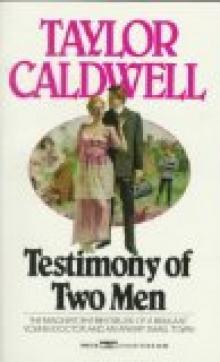 Testimony of Two Men
Testimony of Two Men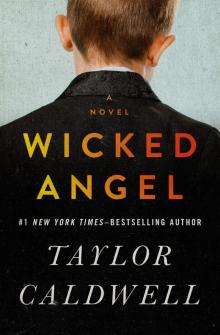 Wicked Angel
Wicked Angel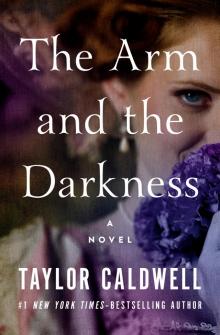 The Arm and the Darkness
The Arm and the Darkness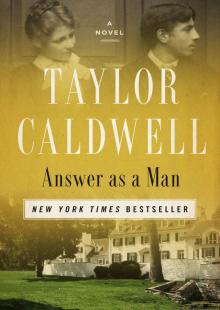 Answer as a Man
Answer as a Man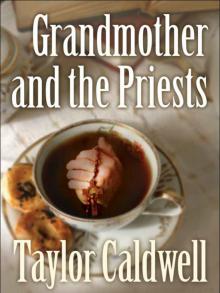 Grandmother and the Priests
Grandmother and the Priests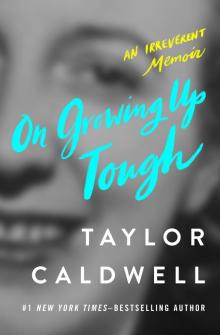 On Growing Up Tough: An Irreverent Memoir
On Growing Up Tough: An Irreverent Memoir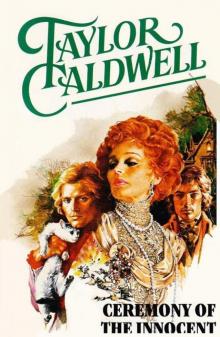 Ceremony of the Innocent
Ceremony of the Innocent The Listener
The Listener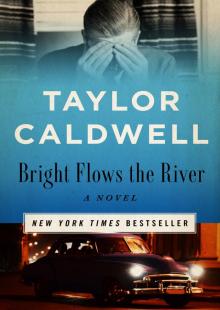 Bright Flows the River
Bright Flows the River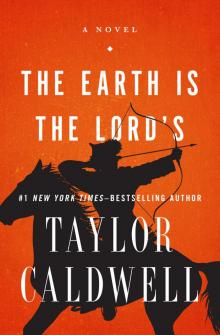 The Earth Is the Lord's
The Earth Is the Lord's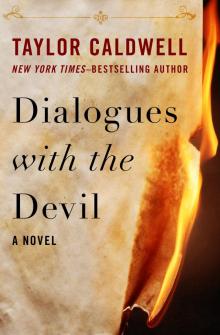 Dialogues With the Devil
Dialogues With the Devil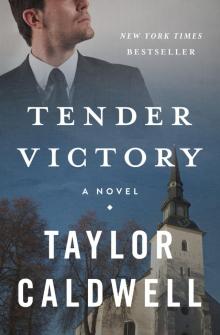 A Tender Victory
A Tender Victory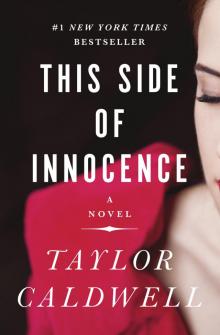 This Side of Innocence
This Side of Innocence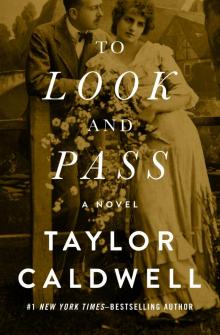 To Look and Pass
To Look and Pass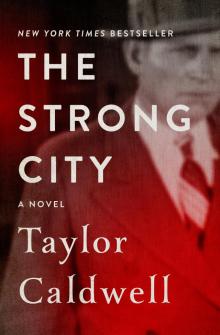 The Strong City
The Strong City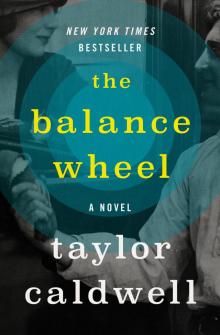 Balance Wheel
Balance Wheel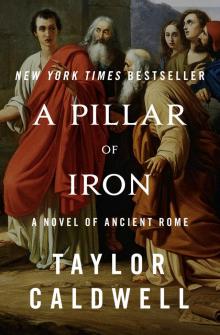 A Pillar of Iron: A Novel of Ancient Rome
A Pillar of Iron: A Novel of Ancient Rome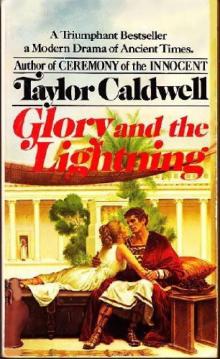 Glory and the Lightning
Glory and the Lightning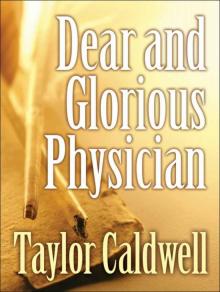 Dear and Glorious Physician
Dear and Glorious Physician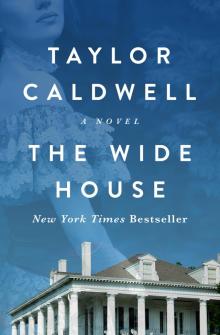 The Wide House
The Wide House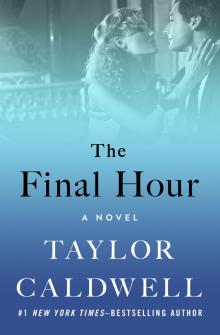 The Final Hour
The Final Hour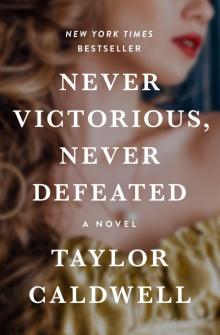 Never Victorious, Never Defeated
Never Victorious, Never Defeated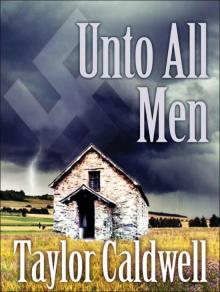 Unto All Men
Unto All Men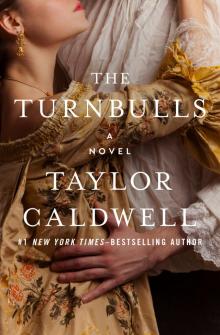 The Turnbulls
The Turnbulls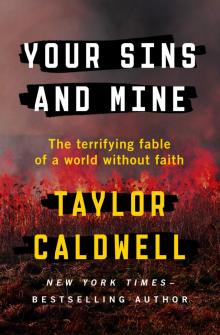 Your Sins and Mine: The Terrifying Fable of a World Without Faith
Your Sins and Mine: The Terrifying Fable of a World Without Faith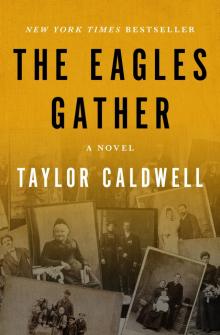 The Eagles Gather
The Eagles Gather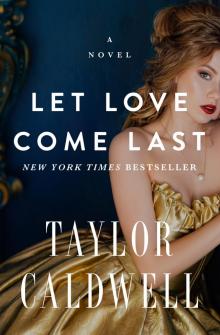 Let Love Come Last
Let Love Come Last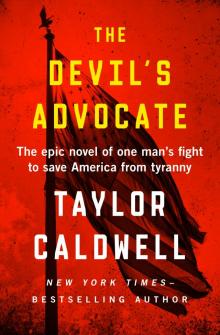 The Devil's Advocate: The Epic Novel of One Man's Fight to Save America From Tyranny
The Devil's Advocate: The Epic Novel of One Man's Fight to Save America From Tyranny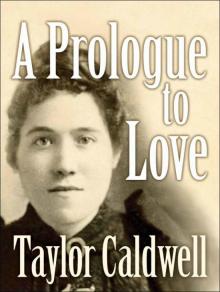 A Prologue to Love
A Prologue to Love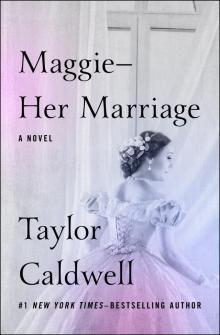 Maggie: Her Marriage
Maggie: Her Marriage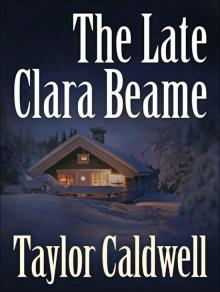 The Late Clara Beame
The Late Clara Beame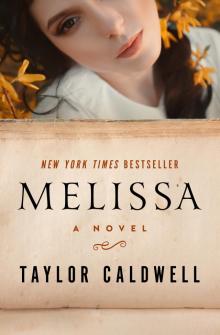 Melissa
Melissa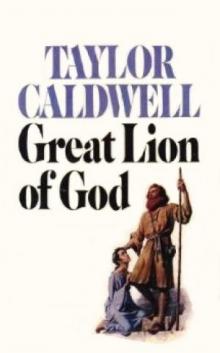 Great Lion of God
Great Lion of God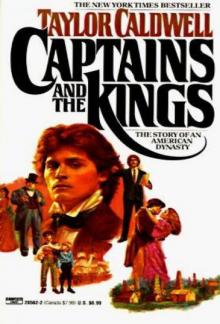 Captains and the Kings
Captains and the Kings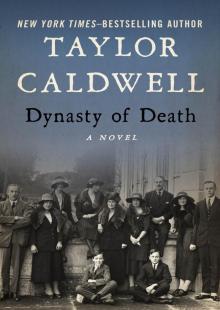 Dynasty of Death
Dynasty of Death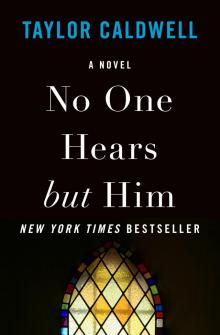 No One Hears but Him
No One Hears but Him The Sound of Thunder
The Sound of Thunder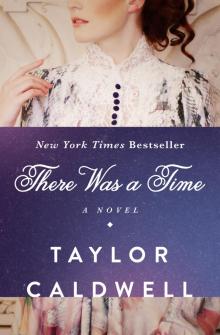 There Was a Time
There Was a Time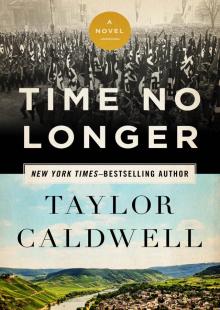 Time No Longer
Time No Longer I, Judas
I, Judas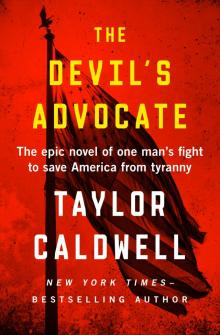 The Devil's Advocate
The Devil's Advocate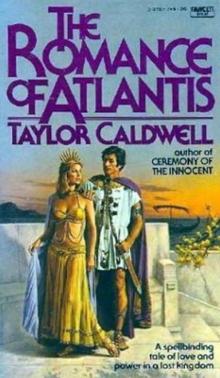 The Romance of Atlantis
The Romance of Atlantis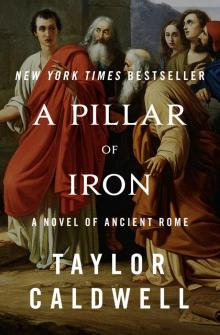 A Pillar of Iron
A Pillar of Iron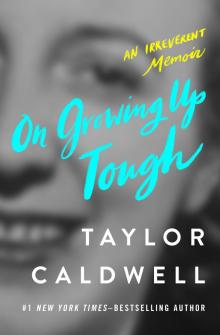 On Growing Up Tough
On Growing Up Tough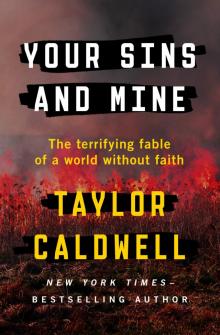 Your Sins and Mine
Your Sins and Mine